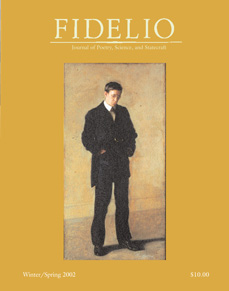Volume 11, Number 1-2, Winter-Spring 2002
Features
Freedom vs. ‘Democracy’: How ‘Democracy’ Became Diseased
by Lyndon H. LaRouche, Jr.
How the ‘Lost Corpse’ Subverts The American Intellectual Tradition
by Stanley Ezrol
Who Were the ‘Nashville Agrarians’?
by Stanley Ezrol
William Shakespeare and Thomas More: The Conscience of Kings
by Paul Gallagher
Pope John Paul II on St. Thomas More
Henry VII and the Creation Of Shakespeare’s England
by Robert Trout
The Magna Carta Versus the Nation-State
by Robert Trout
Editorial
The Crash Is On!
News
D.C. Conference: Continue the American Revolution!
International Webcasts Hear Strategic Direction from LaRouche
Italy: Economic Development To Defeat Clash of Civilizations
Arab Oil Conference ‘The Mideast As A Crossroad’
Brazil: LaRouche Made Honorary Citizen of Sao Paulo
Dialogue of Cultures: Institute Hosts German-Iranian Festival
We Need an International Protocol For Banning Violent Videos
Interview
Pianist András Schiff: ‘The beauty of Bach is the freedom he gives us ...’
by Ortrun Cramer and Hartmut Cramer
Translated from the German by Cloret Ferguson.
Exhibits
A Yearning for the Classical
by Bonnie James
‘Thomas Eakins: American Realist’ The Metropolitan Museum of Art, New York June 18–Sept. 15, 2002.
Commentary
‘Seize the High Ground of Independent Power’
by Lyndon H. LaRouche, Jr.
Lyndon LaRouche replies to a question concerning ‘justice vs. revenge’
Reviews
The Public Wishes To Be Lied To
by Paul Gallagher
Economics: The End of a Delusion by LaRouche in 2004.
Defending Lincoln—And Discovering Him
by Anton Chaitkin
Lincoln’s Virtues, An Ethical Biography by William Lee Miller.
The Higher Standard of Truthfulness
by David Cherry
Unholy War: Terror in the Name of Islam by John L. Esposito
Mozart’s Age of Republican Enterprise
by David Shavin
The Beneficent Dervish by Mozart’s Circle and The Impresario by W.A. Mozart. Boston Baroque, Martin Pearlman, Director

